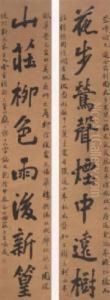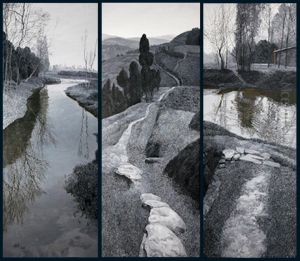Wang Mingsheng Paintings
Wang Mingsheng was a prominent Chinese scholar, calligrapher, poet, and art collector of the Qing Dynasty, whose contributions have left significant marks in the realms of Chinese art and culture. Born in 1693, during a period when China was undergoing substantial social, political, and cultural transformations under the Qing rule, Wang navigated through these changes with his scholarly pursuits and artistic endeavors. He was not only deeply engaged in the study of classical Chinese literature and history but also made considerable contributions to the development of calligraphy and poetry of his time.
Wang Mingsheng's interest in art collecting and connoisseurship also played a crucial role in shaping the artistic landscape of Qing China. He was known for his discerning eye for ancient artifacts and works of art, including paintings, calligraphy, and bronzes. His extensive collection became a significant resource for later generations of scholars and collectors, contributing to the preservation and study of Chinese heritage. Moreover, Wang's critical essays and commentaries on art provided foundational texts for the field of Chinese art history and connoisseurship.
Throughout his life, Wang Mingsheng was deeply involved in the intellectual and cultural circles of his time, engaging with contemporary scholars and artists in discussions and exchanges that enriched the cultural fabric of the Qing Dynasty. His works, both in terms of his art and his scholarly contributions, reflect the broader intellectual currents of his era, emphasizing the importance of historical consciousness and cultural refinement. Wang Mingsheng's legacy is evident in the continued relevance of his writings and collections in the study of Chinese art and culture today. He passed away in 1772, leaving behind a body of work that continues to inspire and inform scholars, artists, and collectors alike.



